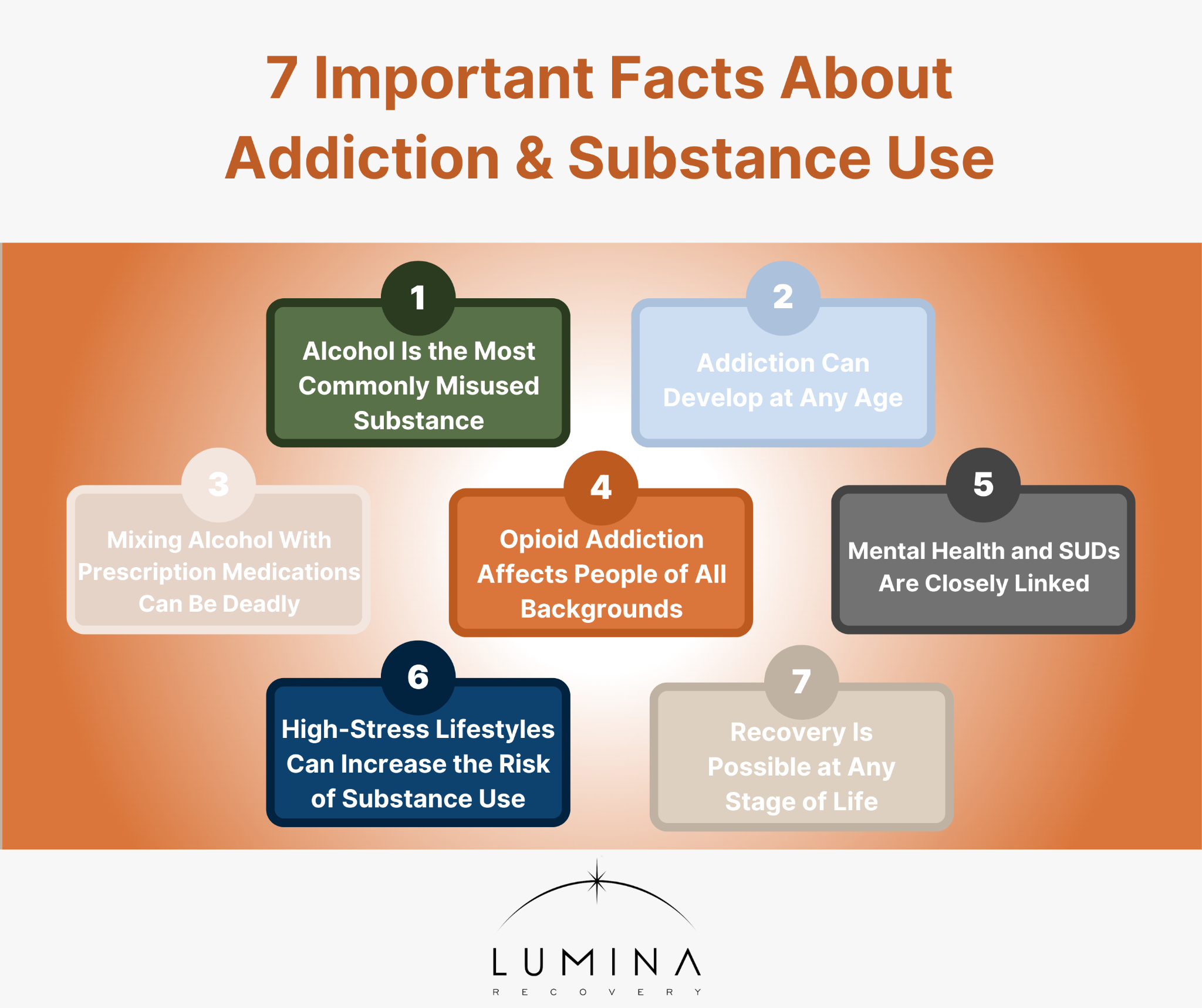National Drug and Alcohol Facts Week (NDAFW) is an annual observance dedicated to spreading awareness about the science and realities of drug and alcohol use. While it was originally created to educate youth, the information shared during this week is important for individuals of all ages.
Whether you’re a college student, a working professional, or someone in long-term recovery, understanding facts about addiction can help you or a loved one make informed choices.
This year, National Drug and Alcohol Facts Week takes place from March 17-23, 2025, making it the perfect time to educate yourself on the risks of drug and alcohol use and the importance of seeking help when needed.
History and Purpose of National Drug and Alcohol Facts Week
The National Institute on Drug Abuse (NIDA) launched National Drug and Alcohol Facts Week in 2010 to educate teens about the science behind drug use and addiction. In 2016, the National Institute on Alcohol Abuse and Alcoholism (NIAAA) joined the effort, expanding its focus to include alcohol education.1
While much of the information shared during NDAFW is geared toward young people, the facts about addiction are relevant for all age groups. Substance use disorders impact people of all backgrounds and understanding addiction facts can lead to smarter choices, early intervention, and successful recovery.

7 Important Facts About Addiction and Substance Use
Whether you’re managing work stress, social pressures, or personal struggles, knowing these key addiction facts can help you make informed decisions.
1. Alcohol Is the Most Commonly Misused Substance
While underage drinking is often discussed, alcohol misuse remains a leading cause of preventable deaths in the U.S. The CDC reports that excessive alcohol use contributes to 178,000 deaths annually, linked to liver disease, heart problems, and accidents.2
2. Addiction Can Develop at Any Age
A common addiction myth is that substance use disorders only affect younger people. In reality, addiction can start at any stage of life. Stress, trauma, mental health struggles, and social drinking that escalate over time can all contribute to dependency.
3. Mixing Alcohol With Prescription Medications Can Be Deadly
Many people take prescription medications, but few realize that combining them with alcohol can be dangerous. Medications like opioids, benzodiazepines (Xanax, Valium), and antidepressants can cause life-threatening side effects when mixed with alcohol, including respiratory failure, blackouts, and overdose.
4. Opioid Addiction Affects People of All Backgrounds
Many people become dependent on prescription painkillers after surgery, injury, or chronic pain treatment. In 2022, approximately 81,800 overdose deaths involved opioids.3
Even those who don’t consider themselves “regular users” are at risk if they take opioids without medical supervision or combine them with other substances. Being aware of addiction facts can help reduce the likelihood of accidental overdose.
5. Mental Health and Substance Use Disorders Are Closely Linked
Substance use often starts as a way to cope with stress, anxiety, depression, or past trauma, but it can quickly turn into a harmful cycle.
The 2023 National Survey on Drug Use and Health reported that 35% of individuals with mental health disorders also have a substance use disorder, and vice versa.4 This is why dual diagnosis treatment, which addresses both addiction and co-occurring mental health issues, is critical for long-term recovery.
6. High-Stress Lifestyles Can Increase the Risk of Substance Use
Many people facing overwhelming work, financial, and personal pressures turn to substances as a way to cope. High-stress environments, such as demanding careers, long work hours, or academic challenges, increase the risk of substance misuse. Common risk factors include:
- Using alcohol to “unwind” after work
- Misusing prescription stimulants (such as ADHD medications) to stay productive
- Using opioids for chronic pain without medical supervision
While stress is a natural part of life, self-medicating with drugs or alcohol can lead to long-term problems.
7. Recovery Is Possible at Any Stage of Life
One of the most important addiction facts to remember is that it’s never too late to seek help for addiction. Whether someone has struggled for years or is just beginning to see the warning signs of addiction, recovery is always possible.

How to Start Your Recovery Journey
Taking the first step toward recovery may seem difficult, but support is available. Here’s how to begin:
- Recognize the signs. If substance use is affecting your health, relationships, or work, it may be time for help.
- Seek professional treatment. Options like detox, inpatient rehab, and outpatient programs provide structure and support.
- Consider dual diagnosis care. If you have co-occurring mental health challenges, integrated treatment is key.
- Reach out for support. Talk to a licensed treatment center, support group, or healthcare provider for guidance.
FAQs
How can I recognize if I have a substance use problem?
If your substance use is affecting your work, relationships, or overall well-being, it may be time to seek help. Signs of addiction include increased tolerance, withdrawal symptoms, and an inability to cut back despite negative consequences.
What treatment options are available for those struggling with addiction?
Detox, residential inpatient treatment, outpatient programs, and specialized programs are available for those struggling with addiction. Dual diagnosis treatment for those facing both addiction and mental health challenges is important as well.
Is it possible to manage addiction while in college or working full-time?
Yes. Specialized college programs and outpatient treatment options allow individuals to continue their education or careers while receiving support. Flexible scheduling and telehealth services make it easier to balance recovery with daily responsibilities.
What should I do if a friend or colleague is struggling with substance use?
Express concern without judgment and encourage them to seek professional help. Providing resources and offering support can make a significant difference in their decision to seek treatment.
Take the Next Step Toward Recovery With Lumina Recovery
National Drug and Alcohol Facts Week is an opportunity to learn the truth about addiction and take proactive steps toward health and wellness. Whether you or a loved one is struggling with substance use, help is available.
At Lumina Recovery, we offer inpatient rehab and outpatient programs to help individuals overcome addiction and reclaim their lives.
Take control of your future and contact Lumina Recovery today to start your journey toward healing.
Sources:


